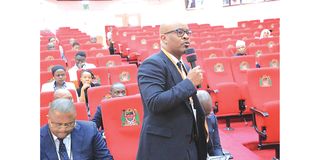Prime
Tanzania’s private sector says fiscal proposals in 2025/26 budget undermine reinvestment

TPSF chief executive officer, Mr Raphael Maganga, speaks during a consultative session hosted by the Parliamentary Budget Committee in Dodoma over the weekend. PHOTO| CORRESPONDENT
What you need to know:
- Tanzania Bankers Association representative, Mr Abdulmajid Nsekela, cautioned that the proposed tax could particularly harm the banking sector, which relies heavily on retained earnings to meet capital adequacy requirements imposed by the Bank of Tanzania
Dodoma. As Parliament prepares to approve the government’s Sh56.49 trillion budget for the 2025/26 financial year tomorrow, June 24, private sector representatives have raised concerns over several proposed fiscal measures, warning they could undermine investment, economic growth, and social protection.
During a consultative session hosted by the Parliamentary Budget Committee over the weekend, business leaders expressed reservations about specific clauses in the Finance Bill that they say could dampen investor confidence and reduce policy predictability.
Speaking at the session, Tanzania Private Sector Foundation (TPSF) chief executive officer, Mr Raphael Maganga, called on the government to adopt tax measures that stimulate growth rather than constrain business expansion.
“The proposed 10 percent withholding tax on retained earnings will affect companies of all sizes indiscriminately and contradicts the government’s efforts to formalise businesses. It is difficult to see how informally operating businesses will be encouraged to formalise if doing so results in an additional tax burden. Let us tax for growth, not just for revenue,” Mr Maganga told the Committee.
He argued that Tanzanian companies remain relatively small compared to regional and global peers and should be supported to build capital through reinvestment.
“Six months is simply too short a time to expect businesses to have the capacity to reinvest retained earnings,” he said.
Mr Maganga warned that although the measure may generate approximately Sh130 billion in revenue, the broader economic harm could far outweigh the gains.
He described the move as a form of double taxation, pointing out that retained earnings have already been taxed as corporate income.
However, in his budget presentation to the National Assembly earlier this month, Finance Minister Dr Mwigulu Nchemba defended the measure, arguing it addresses a long-standing gap that some firms have exploited under the guise of reinvestment.
“The measure is expected to increase government revenues by Sh130.62 billion,” Dr Nchemba said.
In a social media post, the minister further clarified: “Withholding tax on retained earnings is not double taxation. It is an anti-avoidance rule designed to uphold the equity principle of taxation, where dividends are taxed but retained earnings are not.”
Special Seats MP Neema Lugangira voiced support for the tax in principle but urged improvements in its application.
She called on the Tanzania Revenue Authority (TRA) to provide clearer guidelines on what qualifies as legitimate reinvestment and recommended extending the compliance window from six months to one year to give businesses more time to adjust.
Tanzania Bankers Association representative, Mr Abdulmajid Nsekela, cautioned that the proposed tax could particularly harm the banking sector, which relies heavily on retained earnings to meet capital adequacy requirements imposed by the Bank of Tanzania (BoT).
“Banks operate in a highly regulated environment. The proposed tax contradicts existing regulations, which restrict the distribution of retained earnings as dividends. It could negatively affect core capital levels and, by extension, long-term financing capacity,” Mr Nsekela said.
Deloitte tax partner Mr Samwel Ndandala, argued that rather than introducing new taxes, the government should focus on strengthening profit-reporting systems to combat tax evasion.
He also advocated for exemptions for start-ups and banks, and for clear guidelines on the tax’s effective date.
Other contentious proposals in the Finance Bill include a three percent VAT withholding requirement.
TPSF has warned that this could constrain suppliers’ cash flow, delay credit issuance, and increase the frequency of audits.
Mr Maganga proposed aligning VAT withholding deadlines with income tax schedules, leveraging e-filing systems, and exempting compliant firms.
On excise duties, Mr Maganga criticised the proposed increase on beer and alcoholic beverages, noting it breaches the government’s 2023 pledge to maintain a moratorium on excise hikes until 2026.
He called for imported products to bear any new excise burdens instead.
Mr Maganga also expressed concern over a proposed $44 mandatory travel insurance charge for tourists, modelled on Zanzibar’s scheme. He argued that the fee risks duplicating existing insurance coverage, increasing costs for budget travellers, and discouraging multi-destination travel within Tanzania.
While acknowledging the government’s imperative to broaden its revenue base, Mr Maganga urged caution: “Without thoughtful adjustments, these proposals risk undermining reinvestment, overburdening SMEs, and eroding policy credibility.”
“By refining the proposals, the government can still expand the tax base while preserving local investment, ensuring fiscal fairness, and cultivating a transparent economic environment,” he added.
The TPSF submission was supported by several leading industry bodies, including the Tanzania Bankers Association, the Confederation of Tanzania Industries (CTI), the Tanzania Business Community (JWT), CEO Roundtable of Tanzania, the Agricultural Council of Tanzania, and the Agricultural Non-State Actors Forum.
Representing more than 250 business associations and over five million enterprises nationwide, TPSF’s intervention underscores a broad-based call for balanced, growth-oriented fiscal policymaking.




